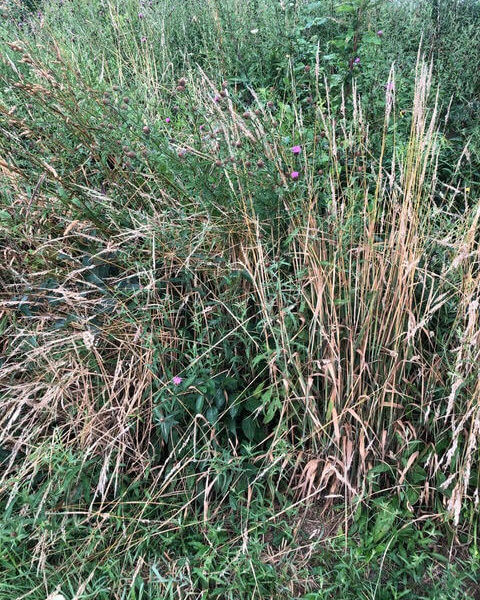
Weeds and Wheat
Jesus put before the crowd another parable: “The kingdom of heaven may be compared to someone who sowed good seed in his field; but while everybody was asleep, an enemy came and sowed weeds among the wheat, and then went away. So when the plants came up and bore grain, then the weeds appeared as well. And the slaves of the householder came and said to him, ‘Master, did you not sow good seed in your field? Where, then, did these weeds come from?’ He answered, ‘An enemy has done this.’ The slaves said to him, ‘Then do you want us to go and gather them?’ But he replied, ‘No; for in gathering the weeds you would uproot the wheat along with them. Let both of them grow together until the harvest; and at harvest time I will tell the reapers, Collect the weeds first and bind them in bundles to be burned, but gather the wheat into my barn.’”
Then he left the crowds and went into the house. And his disciples approached him, saying, “Explain to us the parable of the weeds of the field.” He answered, “The one who sows the good seed is the Son of Man; the field is the world, and the good seed are the children of the kingdom; the weeds are the children of the evil one, and the enemy who sowed them is the devil; the harvest is the end of the age, and the reapers are angels. Just as the weeds are collected and burned up with fire, so will it be at the end of the age. The Son of Man will send his angels, and they will collect out of his kingdom all causes of sin and all evildoers, and they will throw them into the furnace of fire, where there will be weeping and gnashing of teeth. Then the righteous will shine like the sun in the kingdom of their Father. Let anyone with ears listen!”
Reading through Matthew’s gospel, we have come to the rich vein of parables, Jesus’ primary teaching tool. A large crowd has gathered by the Sea of Galilee to hear him. To evoke the Kingdom of Heaven, Jesus uses metaphors that connect to the reality of people living close to the land. Some of his agrarian images are a stretch for 21st century urban dwellers, like the ones about sheep and goats.
Weeds
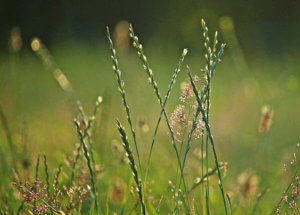 But just about everybody can relate to the problem of weeds—particularly now. Cloistered at home in this Covid crisis, many of us have turned to gardening. With the dry weather we’ve experienced, and the heat rising, we are watering more. The plants are flourishing, and so are the weeds!
But just about everybody can relate to the problem of weeds—particularly now. Cloistered at home in this Covid crisis, many of us have turned to gardening. With the dry weather we’ve experienced, and the heat rising, we are watering more. The plants are flourishing, and so are the weeds!
Weeds are a nuisance in flowerbeds and backyard vegetable gardens. But Jesus describes a critical situation: weeds have been sown in a field of wheat and the two have grown up completely intermingled. In a subsistence economy, every food plant mattered; this was grave. The farm workers offer to root out the weeds right away. But the householder demurs, wary about the risk of pulling out the good with the bad. Wait for the harvest, he says, then separate them out: burn the weeds and gather the wheat into the barn.
As soon as the disciples are alone with Jesus, they ask him what the parable means. Jesus tells them that wheat represents good people and the weeds are evil people, whose fates will be sealed at God’s final judgment.
It is dramatic, simple, an attractive interpretation. And it’s bound to be a comfort to the disciples to be implicitly counted among the “righteous shining forth in the kingdom of their Father”.
Of course, that is just one way of understanding the story. Parables, like riddles, use metaphor. Different from a riddle, though, a parable doesn’t have a just one interpretation. The strength of every good parable is in the wealth of meanings it can have.
Weeds and Wheat Intermingled
Jesus likens the wheat and the weeds to good and evil individuals. But most people are like more the field in the parable; we are a mixture of the two. Rare is the individual who is purely evil–or purely good, for that matter. Looking back on my 72 years, I see a thorough going blend of wheat and weeds, of good and bad. For example, as a senior curator at the Dallas Museum of Art, I made good contributions to the city with acquisitions that strengthened the collections, and exhibitions that helped educate the visitors. My professional ambition for excellence in collections and programs ran alongside a self-serving one: the need I had for affirmation, admiration, and achievement. Weeds and wheat intermingled.
I mention this because in the wake of George Floyd’s murder, I’ve been looking at my own privileged life, questioning my assumptions, my prejudices, examining my motives, words, and actions. I’m also seeking out the historic truths I never was taught and trying to understand how I can work for change in myself and in the world.
Many, many others around the globe are doing the same. Thoughtful people, communities, and nations are reckoning with the inescapable mixture of good and evil in ourselves, our cities, and our histories, especially the racism in social, economic and governmental systems that has shaped the evil of present injustices.
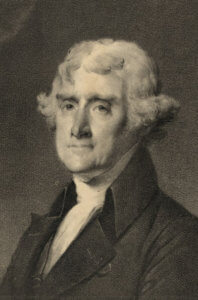
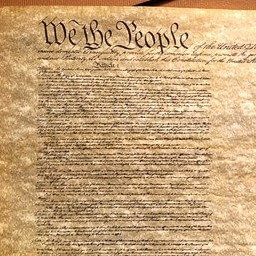 We see that messy mixture in the life of such great leaders as Thomas Jefferson. “We hold these truths to be self-evident, that all men are created equal, that they are endowed by their Creator with certain unalienable Rights, that among these are Life, Liberty and the pursuit of Happiness.” Jefferson’s words in the Declaration of Independence sound today like a godly vision of the equality of all humankind. To Jefferson, however, “all men” meant men, and not just white men, but white men of property. His life was built around that prejudiced assumption. Through his enslavement of people, including those borne to him by their enslaved mothers, Jefferson practiced the evil dehumanization and subjugation of Black people that has come down to this day. Fortunately, his words in the Declaration transcended that worldview and became an enduring ideal, the vision for this nation and others.
We see that messy mixture in the life of such great leaders as Thomas Jefferson. “We hold these truths to be self-evident, that all men are created equal, that they are endowed by their Creator with certain unalienable Rights, that among these are Life, Liberty and the pursuit of Happiness.” Jefferson’s words in the Declaration of Independence sound today like a godly vision of the equality of all humankind. To Jefferson, however, “all men” meant men, and not just white men, but white men of property. His life was built around that prejudiced assumption. Through his enslavement of people, including those borne to him by their enslaved mothers, Jefferson practiced the evil dehumanization and subjugation of Black people that has come down to this day. Fortunately, his words in the Declaration transcended that worldview and became an enduring ideal, the vision for this nation and others.
Good and Bad Interwoven
Wheat and weeds, good and bad, are inextricably interwoven in the reality of every city, including our own. The sinful Atlantic slave trade was the economic engine in Colonial times that created Newport’s “Golden Age”. At the same time, the ingenuity, labor, and skill and of the enslaved and their descendants has contributed immeasurably to life in the City by the Sea—and it still does.
Jesus began this parable by likening the Kingdom of Heaven to the behavior of the householder, who is a God figure. The man’s thoughtfulness contrasts with the workers’ impulse quickly to solve the problem of the weeds. Because he weighs the risk of judging and acting too soon, the householder is content to let the plants continue to grow until they have matured. Only then will he judge and condemn.
What might this parable mean to you today? Does it have any bearing on your life? I invite you to think about its meaning for yourselves in the days to come.
The Landowner’s Perspective
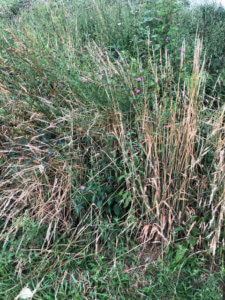 By nature, I’m like the workers: in a hurry to act, to fix things. At the same time, I realize I need to know more, mature more in knowledge and understanding. So, today, in the midst of my grief about racial injustice and my impulse to do something, two key qualities in the landowner stand out to me.
By nature, I’m like the workers: in a hurry to act, to fix things. At the same time, I realize I need to know more, mature more in knowledge and understanding. So, today, in the midst of my grief about racial injustice and my impulse to do something, two key qualities in the landowner stand out to me.
The first is the importance of his perspective. He sees the situation differently than his workers do. He takes the long view, waiting for the full picture once the crops have grown completely. He may know that the weeds are short lived and weak, that in time they will die back, even nourish the wheat as they decompose. If the weeds represent the evil in me, I’m grateful for the time when they can wither away, be eclipsed by the good, or be rooted out.
Along with his detached perspective, the parable’s landowner has patience, the ability to wait, and to trust. This is so hard for white, entitled people like me, like many of us, who are accustomed to action, to solving problems our way.
God’s Long View
Friends, this is one of many reasons why we need the scriptures, need to worship. Scriptures help us see the presence and action of God in history, the incremental advances over time—sometimes centuries, even millennia—the long moral arc of the universe that does bend toward justice. Worship helps us remember that God is God and we are not. It helps us stand with awe before the mystery of God’s ability to accept us in our brokenness and help us work through our messy individual and collective lives to bring out the good.
Perspective and patience: both seem critical in our time of waiting and uncertainty. This period between parentheses is a precious gift: it allows us to seek new perspectives, to do the study and the deep inner work of confronting racial injustice in our own lives and in our society. It’s also a call to wait with patience, to trust that God will be a present guide in the waiting, and will welcome us all home in the end.
I’d like to close with a prayer.
Holy and loving God, our times, our lives are truly in your hands. In this season of waiting, as we research, recollect and reflect, give us the perspective to recognize the truth in our histories and ourselves. By your grace, give us the humility to honor what is good, the courage to repent of what is evil, and the strength to repair what is broken. As the uncertainty of this Covid season stretches out before us, give us patience and kindness with ourselves and others, and bless us with the confidence to work with you, always entrusting our lives and our fates to your infinite care.
Amen.
